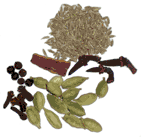Healthy spices Nutrition facts
Elevate your palate and boost your immune system by incorporating nutritious spices into your daily diet!
Spices don't just tantalize your taste buds; they also contain a remarkable array of phytonutrients, essential oils, antioxidants, minerals, and vitamins that are vital for your overall well-being!
 |
 |
| Healthy spices! | Curry leaf plant. |
Spices have played a crucial role in our culinary heritage for centuries, and their significance has only grown with their expanding medicinal applications. We owe much of this global spice dissemination to the endeavors of Arab and European explorers, who shared these precious ingredients with the world. As a result, spices have become universally beloved, gracing the kitchens of households across the globe today!
List of healthy spices along with the illustration of their nutrition facts and health benefits:
Spices can be classified based on their botanical origin, categorized according to the part of the plant they are derived from as follows:
Leaves of aromatic plants: Examples include bay leaf, rosemary, thyme, etc.
Fruits or seeds: Examples include fennel, nutmeg, coriander, fenugreek, mustard, and black pepper, etc.
Roots or bulbs: Examples include garlic, galangal, turmeric, ginger, etc.
Bark: Cinnamon, Cassia, etc.
Why incorporate spices in our diet?
Spices are packed with a rich assortment of natural compounds derived from plants, renowned for their disease-preventing and health-enhancing properties. Throughout history, they have been prized for their anti-inflammatory, carminative, and anti-flatulent qualities.
These spices' constituents have been shown to possess anticoagulant properties, preventing blood platelet aggregation and promoting smooth blood circulation, thereby reducing the risk of strokes and coronary artery disease.
The active components in spices can promote efficient digestion by stimulating the secretion of gastrointestinal enzymes and enhancing intestinal tract motility.
For relieving sore throats and symptoms of bronchitis, gargling with warm thyme water is effective. Thyme is also utilized as an antiseptic mouthwash for treating dental caries and gingivitis.
A decoction of select beneficial spices is used to treat conditions like colds, influenza, mild fevers, indigestion, stomach discomfort, and painful menstruation.
In traditional medicine, spices are used as anti-helminths to combat intestinal worm infestations.
Certain essential volatile oils found in spices such as cloves and peppers can increase local blood circulation, making them a popular home remedy for arthritis and muscle soreness when applied as poultices or added to hot baths.
Spice essential oils find application in aromatherapy and are used in the perfume industry for their aromatic properties.
Spices are a good source of essential minerals like potassium, manganese, iron, and magnesium. Potassium plays a crucial role in regulating heart rate and blood pressure, while manganese acts as a co-factor for the antioxidant enzyme superoxide dismutase.
Utilization of Spices in Cooking
Spices possess a wide range of aromas and flavors, ranging from fragrant and pungent to peppery or slightly bitter. To preserve their aromatic qualities and flavors, it's best to add them to dishes at the last moment, as extended cooking can lead to the loss of essential oils.
Throughout history, spices have played a pivotal role in the creation of soups, barbecue sauces, pickles, and have served as the primary component in various curry powders.
Spices, often combined with seasonal herbs, are used to elevate the taste and aroma of dishes featuring vegetables, poultry, seafood, and meats.
In addition to culinary applications, certain beneficial spices like cloves, cardamom, and coriander are incorporated into flavored beverages.
Spices are predominantly composed of essential oils, phytochemicals, antioxidants, vitamins, and phytosterols. It is advisable to incorporate them in small quantities into your diet. Medicinally, spices are employed as a home remedy for improving digestion, alleviating arthritic pain and muscle soreness, and are often used in poultices and hot baths.
≻≻-Back to Home page from Healthy Spices.
Further Resources:
Stanford School of Medicine Cancer information Page- Nutrition to Reduce Cancer Risk.
Gernot-Katzer's spice pages. (Opens in new window)


























